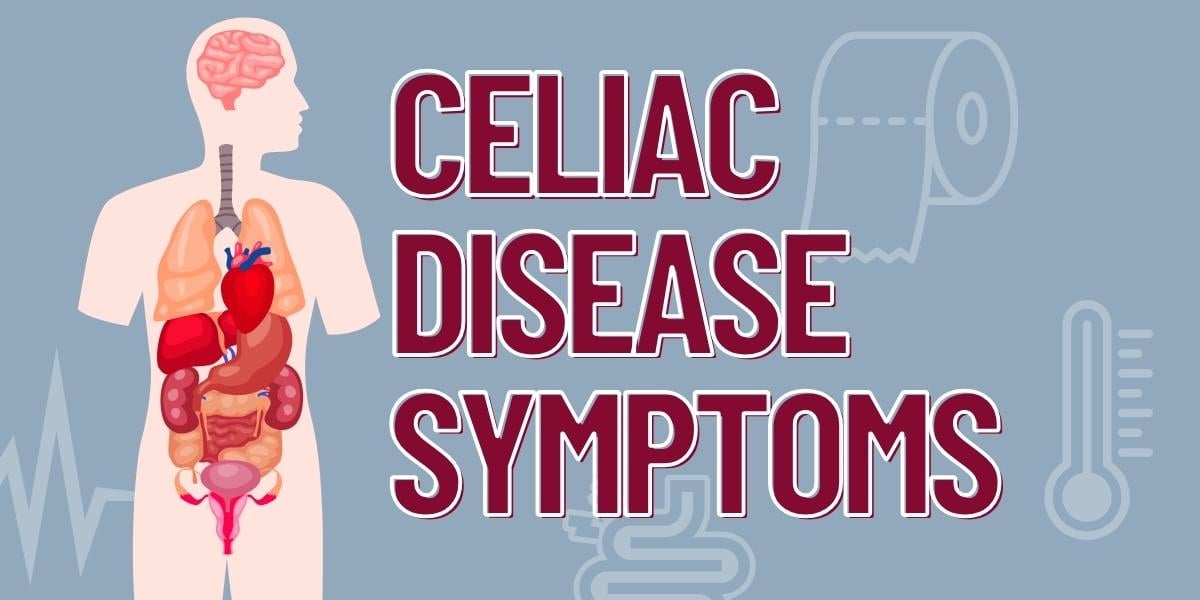Do you suspect you may be having trouble with gluten? Eating gluten could affect you in a lot of different ways, so figuring out whether you have celiac disease or non-celiac gluten sensitivity can be confusing and frustrating. Empower yourself by knowing what signs and symptoms of celiac disease to look for, as well as how to get a diagnosis.
Disclaimer: The content provided in this article is intended solely for educational and informational purposes. It is not meant to replace professional medical advice. For personalized health guidance, please consult with a licensed healthcare provider.
Why Is Gluten So Bad for Celiacs?
Celiac disease is caused by an abnormal immune response to gluten. Essentially, the body thinks gluten is the enemy and attacks it, much like when someone eats wheat and has strong allergy symptoms. However, celiac disease is very different from a wheat allergy because it causes damage to the small intestine in the process and leads to a range of celiac disease symptoms.
Specifically, the immune response causes atrophy of the villi located on the inner wall of the small intestine. In other words, the small intestine’s villi are literally wearing away when someone with celiac disease eats gluten.
This is a problem because the villi are finger-like projections that create a huge intestinal surface area and allow your body to absorb the nutrients it needs to function. When the villi are damaged, your intestines can’t get the right amount of nutrients to your body, which leads to additional issues and disorders.
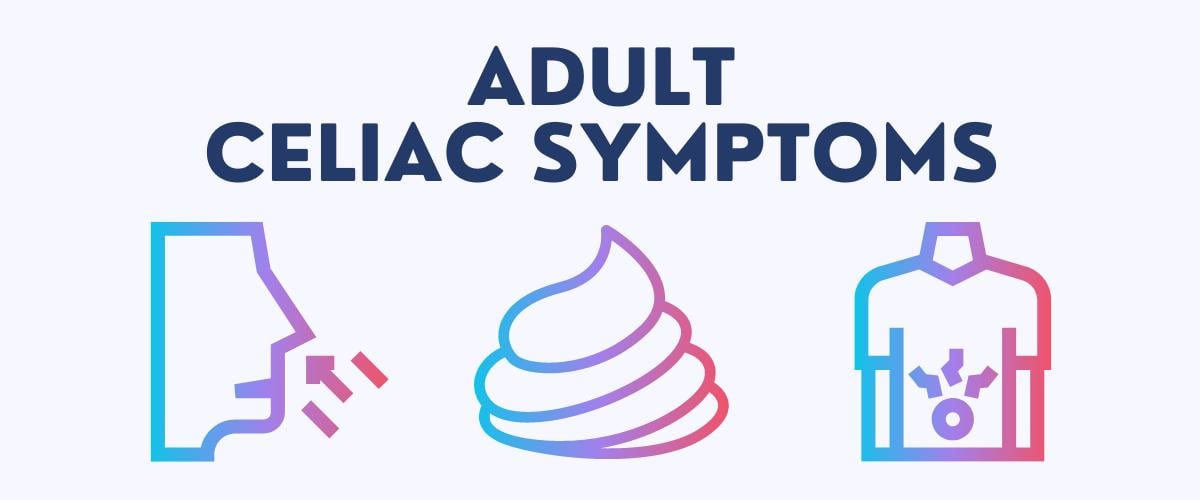
What Are Some Celiac Disease Symptoms in Adults?
When gluten launches its attack on the body, you may start to feel several different symptoms. The digestive tract is the main area affected, though there are plenty of other places in the body you may experience symptoms. Here are the most common celiac disease symptoms adults experience.
Lactose Intolerance
If you have celiac disease, your body may also begin having trouble with dairy. Yep – you may become lactose intolerant because of gluten, and that means ice cream and cheese are also off the table! This happens when the damage to the small intestine causes a decrease in the production of lactase, the enzyme that helps break down foods containing dairy.
Becoming lactose intolerant due to celiac disease is so common that between 10% and 20% of all celiacs can’t tolerate lactose.
Chronic Diarrhea and Constipation
Irregular bowel movements are one of the symptoms celiac disease may cause in adults. If you have chronic diarrhea, meaning you have watery, loose poop three or more times per day for at least four weeks, it could be due to celiac disease.
On the opposite end of the pooping spectrum is constipation, or fewer than two bowel movements a week.
It should also be noted that your body might alternate between diarrhea and constipation. Going too much or too little, you can’t win, right?
Bloating and Gas
Though it can be unpleasant, gas is a perfectly normal bodily process. For celiacs, however, the damage to the intestines makes it harder to break down food, which can cause an excess buildup of gas. This can cause pain or distension in the abdomen and excessive or foul-smelling gas.
Fatigue
Extreme tiredness, weakness, or exhaustion that doesn’t go away with adequate sleep is known as fatigue. If you have celiac disease, your ability to function physically and mentally from day to day may be affected due to this lack of energy.
Joint or Bone Pain
A common symptom of celiac disease is pain in the bones or joints, which can be caused by inflammation or damage to the bones or tendons due to malnutrition. If left untreated, this could advance to more serious or permanent conditions such as arthritis.
Anemia
One important protein found in our blood is hemoglobin, and it is responsible for carrying oxygen throughout the body. If you have celiac disease, you may not absorb enough iron, causing anemia. Signs of anemia include:
- Weakness
- Cold hands
- Brittle nails
- Headaches
- Dizziness
- Pale skin
- Fatigue or low energy
Dermatitis Herpetiformis and Other Skin Rashes
There really is no part of the body celiac disease doesn’t touch. For instance, around 10% of celiac disease patients experience a condition called dermatitis herpetiformis. This skin rash causes intense itching and burning. The treatment is a gluten-free diet.
The skin can be affected by gluten in other ways, too, including causing the following:
- Rosacea
- Psoriasis
- Eczema
- Acne
- Canker sores
Even dry skin can be a symptom of your body’s malabsorption of nutrients.
Mental Health Conditions
Many people who experience chronic illnesses like celiac disease also struggle with mental health. If you are experiencing depression or anxiety, make an appointment with your doctor. Though the connection between celiac disease and mental health is largely unknown, one factor could be that nutritional deficits are contributing to you feeling unwell mentally.
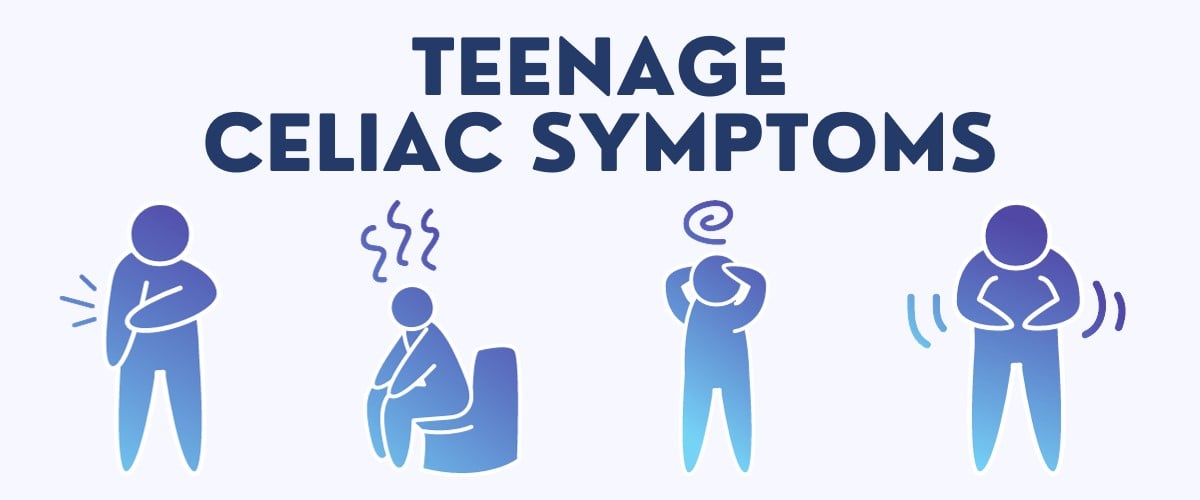
Symptoms of Celiac Disease in Teenagers
Teenagers can experience the same symptoms as adults, but there are others to watch for.
Moodiness and Irritability
Feeling irritable or moody is generally considered normal in teenagers, but don’t overlook celiac disease as a possibility, particularly if other celiac symptoms are present. Feeling unwell and experiencing poor nutrient absorption can greatly affect a teenager’s mood.
Weight Loss and Stunted Growth
If your teenager is not absorbing nutrients properly, their growth can be affected. They may stop growing or lose weight. This is concerning as the adolescent years are a time of rapid growth and changing bodies that need a lot of nutritional support. The good news is that adherence to a strict gluten-free diet will help teens start growing again.
Tiredness or Fatigue
Teens need more sleep than you may realize – between nine and 10 hours a night. Fatigue or tiredness can be common during the teenage years, especially as busy schedules and social lives take over and cause sleep deprivation. With celiac disease, however, this tiredness does not go away with enough sleep.
Delayed Puberty
Puberty typically occurs between the ages of eight and 13 for girls and nine and 14 for boys. The first signs of puberty in girls are growing breast tissue and starting periods. For boys, the penis and testicles begin growing, and the voice starts to deepen.
However, if your adolescent has celiac disease, their body’s hormonal system may be affected, and these changes might not occur. If the signs of puberty seem delayed, visit your teen’s doctor, as this could be one of the many celiac disease symptoms.
Acne
Having acne is seen as a normal part of teenage life. However, the disruption in hormone production caused by untreated celiac disease, combined with nutrient malabsorption, can exacerbate an acne problem for many teens with celiac disease.
Attention Deficit Hyperactivity Disorder
Although the connection is not fully understood, researchers have found a link between ADHD and celiac disease. Again, if your teen is experiencing difficulty paying attention or is hyperactive, speak with their doctor, especially if other celiac symptoms are also occurring.
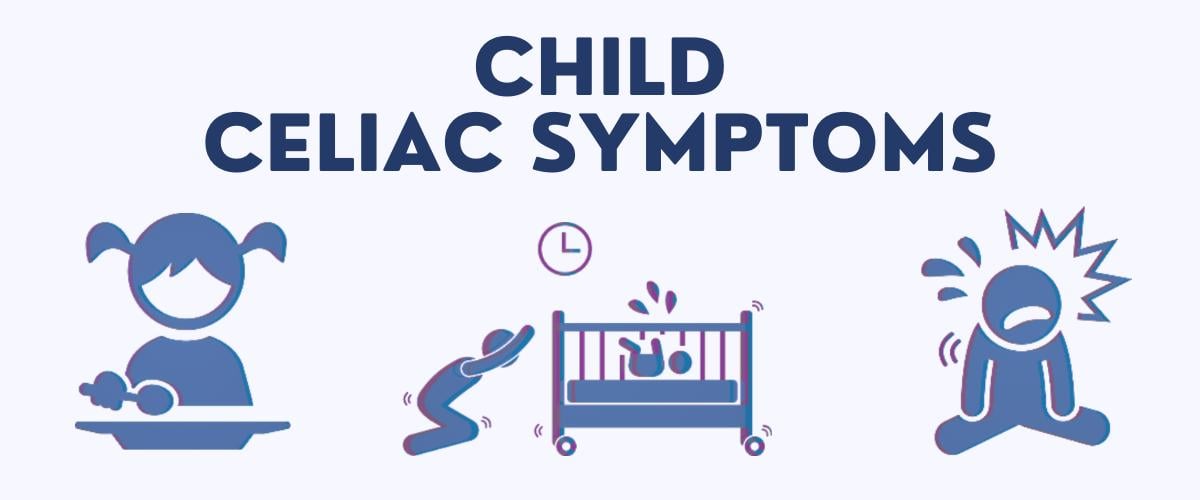
Symptoms Celiac Disease Can Cause in Children
Children, including babies as young as six months, can also be affected by celiac disease. In addition to gastrointestinal issues, there are other celiac disease symptoms in children you want to watch for.
Failure to Thrive
One common symptom of celiac disease in babies and toddlers, especially, is failure to thrive. Failure to thrive is a condition where children do not grow and gain weight like normal. This is caused by poor nutrient absorption due to celiac disease’s attack on the small intestine. The effects of failure to thrive can cause significant delays in social, emotional, and gross motor skills, such as smiling, talking, crawling or walking.
Damage to Tooth Enamel
Before your young child’s permanent teeth even come in, nutrient deficiencies and immune reactions can cause permanent damage to the enamel, resulting in excess cavities, patchy yellow or brown stains, and even grooves on the teeth.
Distended Belly
One of the signs of celiac disease in kids is a distended belly. An excess buildup of gases can cause your child’s tummy to stick out significantly. This can cause discomfort and may be accompanied by a lot of smelly gas.
Poor Appetite
Picky eating is common in young kids, but the problem can become more severe in a child with celiac disease. Your child may have a distaste for certain foods or a general dislike of eating because they feel sick after consuming certain things.
Learning Disabilities
The exact reason children with celiac disease might experience an increased risk of learning disability isn’t fully understood. Despite this, it is important to note that things like ADHD and learning disabilities may be connected to celiac disease. Since learning is such an important part of a child’s development, watch for any signs that your child has difficulty following directions, staying organized, or staying on task.
Delayed Growth
One of the common signs and symptoms of celiac disease in children is delayed growth. This may happen anytime and is a particular cause for concern when the growth rate slows significantly. It indicates that their body has stopped getting all the nutrients it needs.
Irritability and Moodiness
Anyone, especially a child, who doesn’t feel well is entitled to be a little moody or irritable, don’t you think? But if your child is experiencing frequent mood changes, particularly when accompanied by other symptoms of celiac disease, it may be time to get them tested.
Symptoms of Silent Celiac Disease
It is possible to have celiac disease without experiencing any symptoms. Known as “silent celiac disease” or “asymptomatic celiac disease,” you experience the consequences of consuming gluten without ever realizing you are sick.
Often, asymptomatic celiac disease is detected when blood tests or endoscopies are performed for other issues. Additional tests may be ordered for an official diagnosis. Remember, doctors are looking for damage to the small intestine. If you have silent celiac disease, you will have this damage, even if it has not caused typical gastrointestinal symptoms such as diarrhea or bloating.
In some cases, you may be experiencing silent celiac disease and simply might not associate your health issues with eating gluten. You may even realize your symptoms have gone away once you receive a diagnosis and start a gluten-free diet. For example, you may experience less joint pain or fewer headaches, chronic sinus issues, and muscle aches.
Being an asymptomatic celiac has serious risks, as the damage to the intestines may continue for longer periods, causing more significant wasting away of the intestinal villi. This can result in the development of other autoimmune disorders like multiple sclerosis or Type 1 diabetes. Additional risks include intestinal cancers, heart disease, and neurological problems such as migraines or epilepsy.
Unusual Symptoms of Celiac Disease
Every part of the body can be affected by the symptoms celiac disease causes. Having one or more of the following uncommon ailments could indicate you have celiac disease.
Immune System Disorders
Because the immune system attacks gluten and causes damage to the small intestine, the body may be more likely to develop other abnormal immune responses. One of the more common immune system disorders in celiac patients is thyroid disease. Others include multiple sclerosis, hepatitis, and neuropathy. Strictly adhering to a gluten-free diet can help reduce your risk of developing one of these conditions.
Arthritis
Though joint pain is a common symptom celiac patients experience, in some cases, the joints are more severely affected. Inflammation of the joints is a condition known as arthritis. It can be debilitating and severely impact your quality of life.
Osteoporosis
Malabsorption of nutrients due to damage in the small intestine may cause conditions such as osteoporosis. The bones become weakened due to less calcium and vitamin D being absorbed by your bones, increasing your risk of fractures.
Neurologic Conditions
The relationship between celiac disease and conditions of the nervous system isn’t clear, but conditions such as epilepsy, migraines, or neuropathy may develop. In rare cases, the immune system’s reaction to gluten occurs in the brain instead of the small intestine, causing problems with walking and coordination.
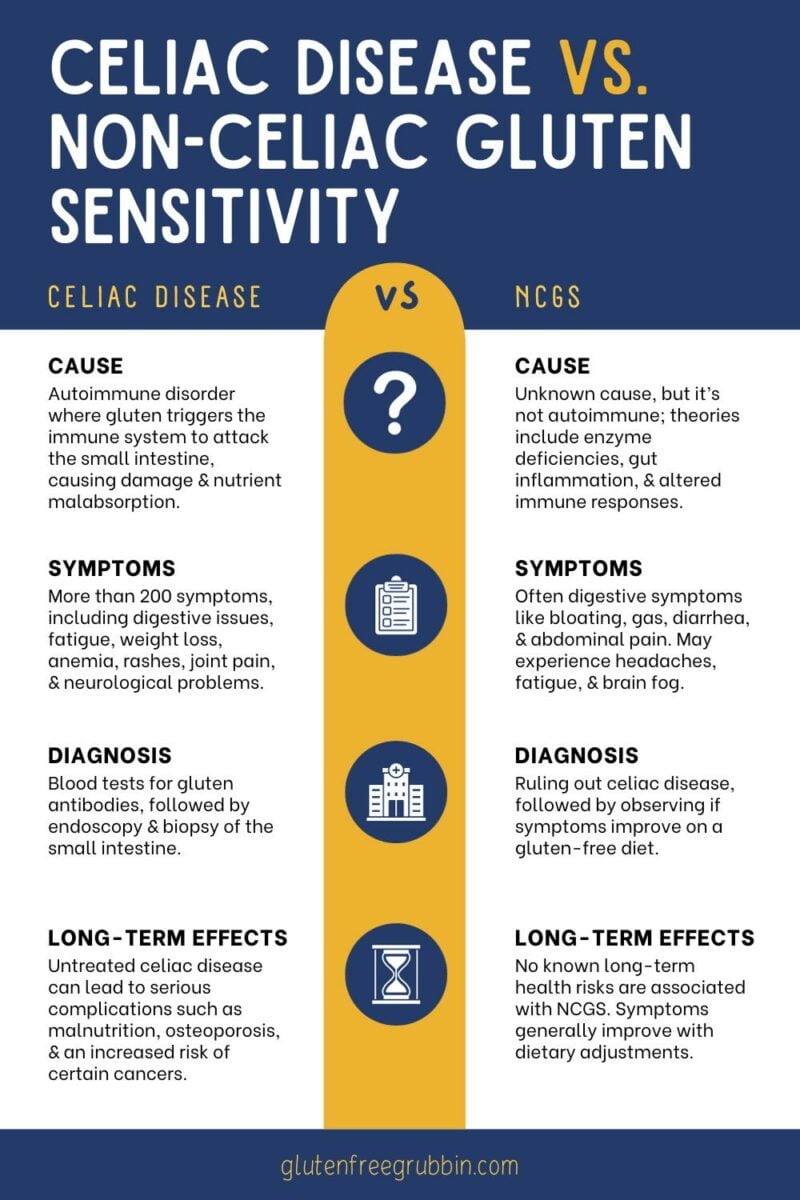
Symptoms of Non-Celiac Gluten Sensitivity
Perhaps you have experienced celiac symptoms but have tested negative for the disease. Maybe you’ve even tried a gluten-free diet and have seen an improvement in your symptoms. This condition is categorized as “non-celiac gluten sensitivity.”
With NCGS, your body does not experience an immune response to gluten. Instead, eating gluten causes your body to produce a higher amount of certain proteins that are responsible for inflammation throughout the body.
Symptoms of non-celiac gluten sensitivity can include:
- Gas
- Bloating
- Diarrhea
- Abdominal cramping
- Fatigue
- Dizziness
While all of those symptoms are exactly like those of celiac disease, non-celiac gluten sensitivity does not cause any damage to the intestines or malabsorption of nutrients.
Scientists believe there is a connection between celiac disease and non-celiac gluten sensitivity, but there is no diagnostic test for NCGS. The only way to determine if you have a gluten sensitivity is to eliminate gluten and see if you feel better. Work with your doctor to see if this is an appropriate treatment plan.
What To Do If You Have Celiac Disease Symptoms
If you’re experiencing any of the symptoms celiac disease causes, there are a few steps you need to take to receive an official diagnosis.
Keep Eating Gluten
If you think gluten is harming your body, you may be inclined to stop eating it right away. But if you want a celiac disease diagnosis (or for celiac disease to be properly ruled out), you need to continue eating gluten while getting testing done. If you eliminate gluten, your body may begin to heal enough to give false negatives on the tests.
If your doctor tells you to stop eating gluten before your celiac disease test, we strongly encourage you to get a new doctor. Celiac disease is highly misunderstood even by medical professionals, so find a doctor who already treats celiacs. Thankfully, a lot of celiac disease research is happening, so doctors are becoming more informed every year about the disease.
Talk to Your Doctor
The first step in getting a diagnosis is to schedule an appointment with your doctor. Explain the symptoms you are experiencing and how long they have been bothering you. It can be helpful to take notes about your symptoms so you don’t forget them during the discussion with your health provider.
Get Blood Tests
There are two types of blood tests your doctor may order. Serology testing looks for elevated antibodies that could indicate gluten is triggering an immune reaction. Genetic testing detects leukocyte antigens that predispose you to having celiac disease.
Get an Endoscopy
If either blood test comes back positive, your doctor can order an endoscopy to look at the small intestine and see if the intestinal villi has worn down. There are two types of endoscopies that may be performed.
The first is a typical endoscopy, which is when a camera connected to a long tube is inserted into your mouth and down through your stomach. This allows your doctor to look at the small intestine and even take samples for a biopsy.
The second type of study is a capsule endoscopy. A camera is placed inside a capsule, which you swallow. As it passes through your digestive system, it takes many pictures that allow your doctor to get a detailed look at your digestive tract.
Ask for a Skin Biopsy
If you have symptoms of dermatitis herpetiformis, a small skin sample can be biopsied. Since this rash is caused by an immune response to gluten, a positive biopsy means you have celiac disease.
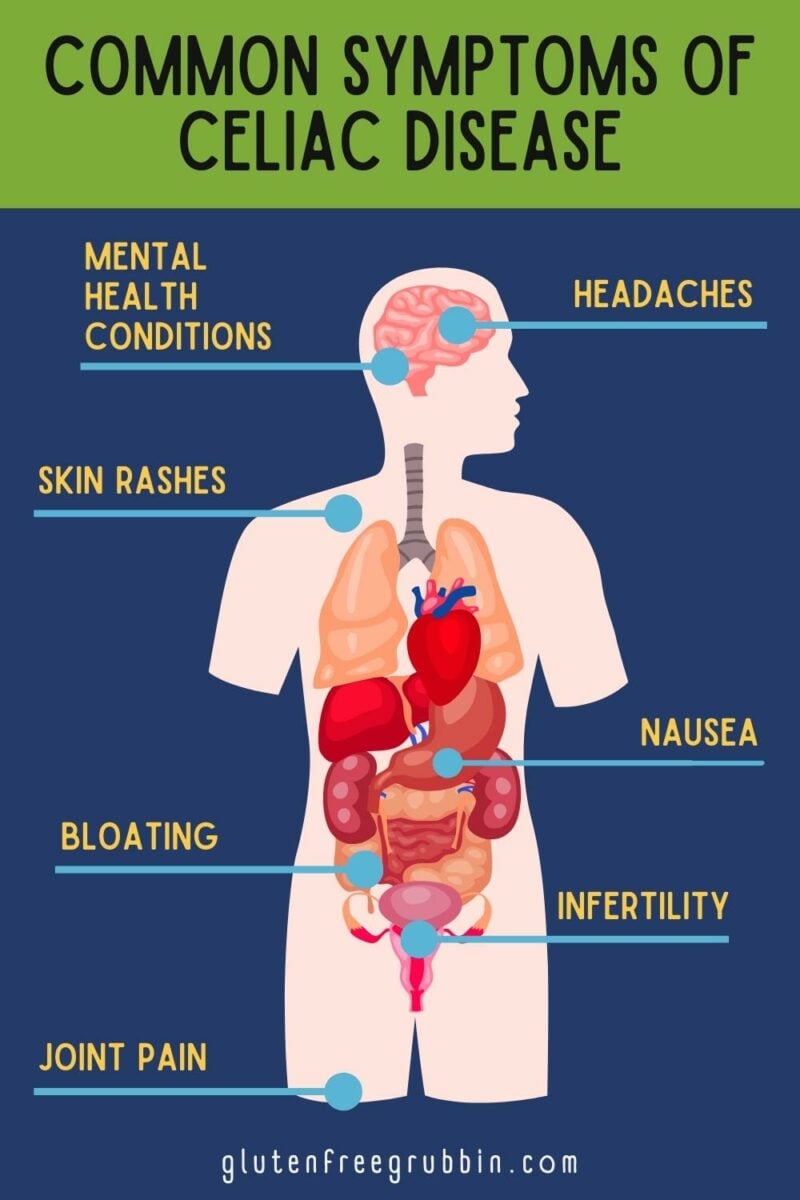
Celiac Disease FAQ
What does celiac disease feel like?
Celiac disease may feel different for each person, but most people talk about how they generally felt unwell, “off,” depressed or anxious before they were diagnosed. Celiac disease signs often start with fatigue and gastrointestinal issues, including nausea, bloating, diarrhea and constipation. Other people went to the doctor because their joints ached and found out it was due to untreated celiac disease.
How common is celiac disease?
Experts estimate that about two million people in the United States and 1% of people worldwide have celiac disease, though many are undiagnosed. You are more likely to have celiac disease if a family member has it.
Can celiac disease come on suddenly?
It is possible to develop celiac disease later in life. After years of eating gluten, your body suddenly stops tolerating it. This can occur if your body has gone through something stressful, such as an infection, pregnancy, or surgery.
Can celiacs ever eat gluten?
Currently, the only treatment for celiac disease is eating a diet completely free from gluten. Over time, the gut will heal itself and symptoms may disappear entirely. This does not mean that it is safe to start eating gluten again. Reintroducing gluten can damage the intestinal villi again, and symptoms may begin to reappear – sometimes even worse than before.
Some studies suggest that some people with celiac disease may occasionally eat small amounts of gluten without damaging the small intestine or experiencing symptoms. Clinical researchers closely monitored these study participants, so we don’t recommend that you try testing this out for yourself. Always follow the recommendations of your doctor.
What are the signs and symptoms of celiac disease?
For adults, the most common celiac disease symptoms are related to the stomach and gut. Nausea, vomiting, bloating, diarrhea, constipation, and gas are some examples. Other symptoms include fatigue, bone or muscle pain, headaches, anxiety, depression, infertility, skin rash, canker sores, and more.
Children and teens may experience the same symptoms as adults, but younger celiacs can also experience delayed puberty, slow growth, weight loss, tooth enamel damage, and irritability.
Can celiac disease kill you?
Celiac disease itself is not fatal, but its effects can lead to conditions that may cause you to die early. For example, those with untreated celiac disease are at a much higher risk of developing some gut cancers and non-Hodgkin’s lymphoma.
Some other repercussions of celiac disease include an increased risk of developing certain conditions such as thyroid disease, diabetes, and coronary artery disease. All these conditions can be fatal.
Can celiac disease cause weight gain?
Typically, celiac disease is associated with weight loss, but some studies have found that you can be an overweight or obese celiac. If you suspect you could have celiac disease, don’t let your doctor dismiss the idea because you aren’t losing weight, especially if you have other symptoms.
Though it is not fully understood how celiac disease causes weight gain, it is thought that someone who can’t properly absorb nutrients may be more inclined to overeat. Basically, they crave more food because their body is trying to make up for nutritional deficiencies. Another theory is due to the potential effects of celiac disease on the thyroid.
How long do celiac symptoms last?
Celiac disease symptoms generally last as long as you continue eating gluten. Once you start following a diet that eliminates gluten, your small intestine can begin to heal, and symptoms will start to go away. It is possible your symptoms may persist or not disappear completely, however, so be sure to work with your doctor.
What does it mean to be glutened?
Being “glutened” means you have accidentally eaten gluten. There are many ways that this can happen, so it is important to be vigilant. Always look at food labels and ask lots of questions when you eat out. If you don’t know where to begin, check out our list of gluten-free fast food options.
Can you have celiac disease without symptoms?
Yes, it is possible to not experience any of the symptoms celiac disease can cause. But even if you don’t have any of the classic signs or symptoms, gluten will still damage your intestinal wall if you have celiac disease. It is also possible you are experiencing symptoms that you may not attribute to gluten, such as headaches, fatigue, or joint pain.
Can you cure celiac disease?
There is no cure, but celiac symptoms can be managed with a strict gluten-free diet. Sometimes symptoms will persist even after eliminating gluten, so it is important to speak with your doctor if this happens to you.
Free Yourself From the Symptoms Celiac Disease Can Cause
The good news is that celiac disease can be managed while researchers look for a cure. Eating strictly gluten-free and avoiding products like shampoos or lotions that contain gluten stops the immune system’s attack on the small intestine. The lining of your small intestine will start to heal, and celiac disease symptoms will ease if not completely disappear.
Although your diet may look different, and you will miss some of your favorite foods, we’re lucky to live in a time when there are so many delicious gluten-free substitutes. Even just 10 years ago, a lot of gluten-free foods were just plain nasty, but they’ve come a long way. Be on the lookout for products that are certified gluten-free, and become best friends with ingredient lists. You can do this!

